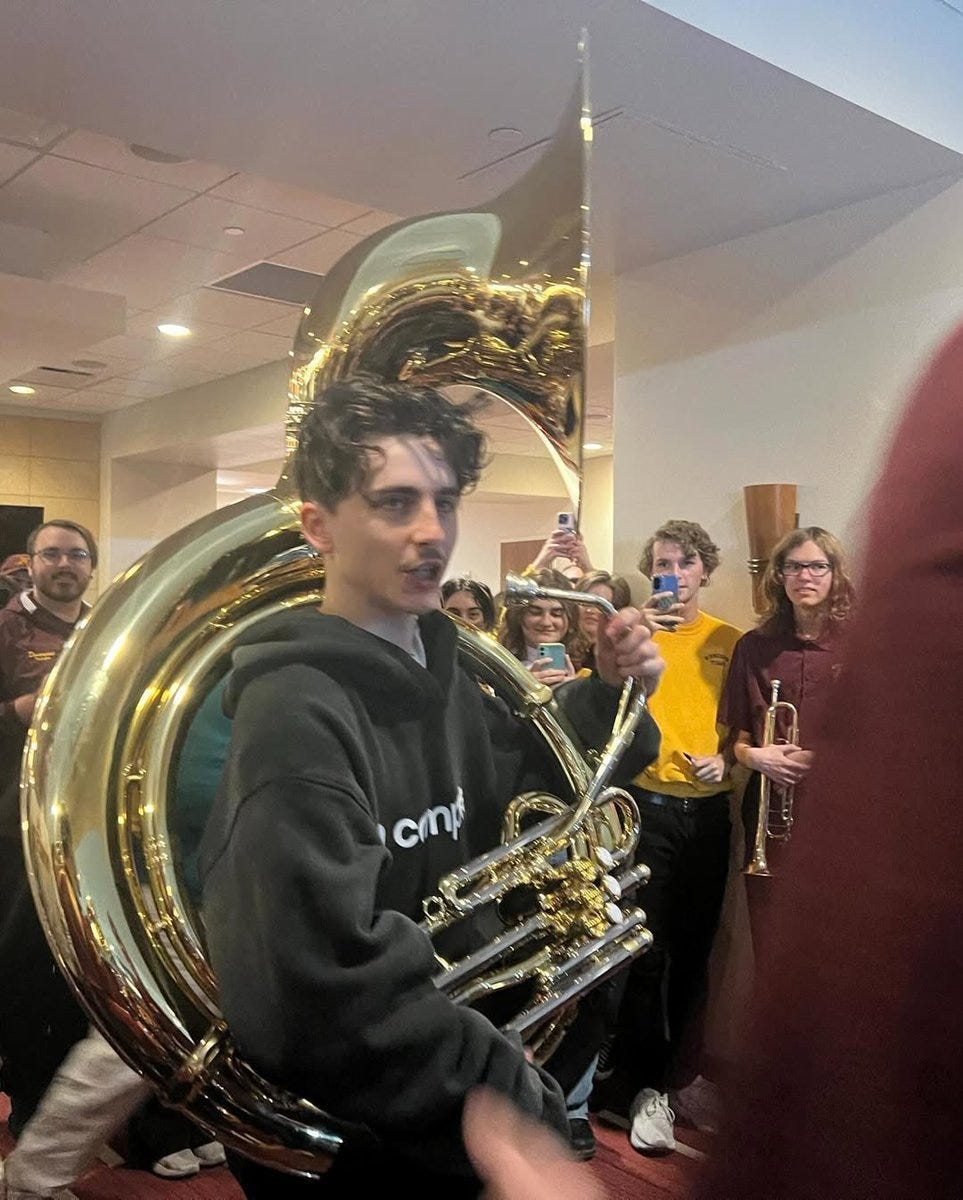Dad Lore
We should all care less about how we are perceived
Maybe you’ve seen it. I think it was a Tiktok screenshot specifically— of a newborn overlaid with text reading something to the tune of “lil bro missed everything.”
My future kids have already missed the first 23 years of my life and are on track to miss the first 24. The plan is for them to miss a few more. In the meantime, I am focused on accumulating dad lore.
Dad lore is the exposition of your father that precedes you. You have to probe to uncover it.
Similarly, there is friend lore: the exposition of your friends that proceeds your meeting them. If my friends went band for band in a lore-off, Mariam would win and Ahlaam would come in a venerable runner up—both of their stories spanning international borders. Mayán might sneak in at third for the same reason if she gets to include family stories and Fahad would put up a good contest but that’s not fair because he’s like 40.
Everyone has been going out of their way to be mysterious for the last few years. I blame J. Cole for this. We know nothing about anyone because they don’t want us to know anything about them. As social media becomes nearly as much of the real world as the real world is part of the real world, the sexiest persona to have is a faint one. One should be perceived as little as possible—and if perceived, they should never be understood: that’s the idea. An insincere mysteriousness. It irks me most when I see upcoming musicians play into this bit. If you have 14 monthly listeners on Spotify, your Instagram cannot read “aucun publication” (my phone is in French). Give us something!
I find it interesting that this is how we have chosen to behave as the generation that grew up under the custody of 21st century surveillance. From afar, the choice to withhold access to yourself resembles a radical rejection of state surveillance. No posts. No profile pic. No highlights. Cryptic stories twice a year three times maybe. It seems like the perfect evasion of the rising Palantirs and NVIDIAs. But closer up, the blank slate Instagram user switches apps and accepts all cookies on Safari and gives their email to department stores for a 15% discount on today's purchase and fixes their hair in the Target self-checkout security camera. Ring cameras are so common at this point, they’ve lost the eerie luster they once had. And I always take my headphones off and look into the camera at TSA just as I’m told.
We are not resisting the surveillance apparatus. We have bought into surveillance from the top. But we are obsessed with the lateral surveillance we commit against each other.
When you have a crush, you find out everything about them from their Instagram profile. Last week, my younger sister asked my older sister and me ‘what’s the craziest thing you’ve ever done while stalking a crush?’ The question was borrowed from a Cosmopolitan Magazine. Her answer was that she scrolled through his dad’s Twitter feed over several years worth of posts, analyzing his politics. My older sister and I both agreed ‘that’s not that crazy.’
Gen Z has been curating online footprints for so long, we consider other’s digital personas integral with their personhood. So we are each ever-aware of our own. We know we surveil others, so we behave with the understanding that others also surveil us.
When a newcomer joins my lobby of Instagram followers, I observe my profile from a birds-eye view and make the assertions about myself that they might make. Sometimes, I even switch to view my main page from my photography account to truly see through their eyes. This nigga think he Basquiat.
The fixation on our perception from the point of view of others has given us a mirrored perception of ourselves. We know ourselves through how we assume others know us and strive to become the version of ourselves that we want others to perceive.
And since nonchalant is in fashion, everyone is hesitant to care about anything. No. Everyone is hesitant to show that they care about anything. This is why the musicians with 14 monthly listeners have blank feeds. Why my friends share their writing on Close Friends and their art on separate accounts. This is why you share a song from Spotify to your story but delete the draft before sending it. You’re 23. You shouldn’t care so much about an Alex G album. I’m sure someone came up with the term before him—it’s kind of intuitive—but Ocean Vuong calls it “cringe culture.”
This behaviour exhibits offline as well. We avoid talking about politics or football or Love Island or whatever we care about on the basis that it is taboo to talk about them. We withhold expressions of love for our friends because we don’t want to come off too strong. We order at the taqueria in English because we don’t want people to be aware of your subpar Spanish. (You have a 300 day streak on Duolingo, this is your time to shine).
But the most effective way to be cool and mysterious isn’t by erasing evidence of yourself and your passion. It is by being so yourself that you are hard to figure out. My most puzzling friends are not necessarily absent (they sometimes are I must admit). More, they carry with them a unique undetanglabilty1. Their politics are confusing and seemingly contradictory. They have an omnipresent vibe. An abyss of lore. Are always on sidequests. I’ll be at brunch with Haben and see her posting from the graduation ceremony of yet another cousin in Maryland by sunset. Faris is always in a bizarre situation in a strange suburb of Chicago. Jude posts Instagram stories in a new language every time I open that app.
I used to hate Timothée Chalamet. For no real reason. I am just hesitant to align myself with any White Boy of the Month. But I have come to love him.
When Timothée accepted his first SAG Award this year for his performance in A Complete Unknown, he took a manual breath every few words of his acceptance speech. “The truth is, I’m really in pursuit of greatness,” he admitted, acknowledging that “people don’t usually talk like that.”’
Discourse around the speech brought to light that he cares. Timothée wears on his sleeve that he gives a fuck. He showed up to his own lookalike contest in Washington Square Park. He posts videos of himself lipsyncing along to French songs. What finally won me over was seeing him kicking it with a high school band in Minnesota on a random weekday. It reminded me of my friends who are always on sidequests. ‘What the fuck are you doing in Minnesota?’
In a culture of reservation, be the person who gives a fuck. Caring is in fashion. Learn every skill you want. It’s never too late to skate or play guitar or get into sewing. Go to all the places in town you want to go to and be loud about it. Stop being shy. Maybe that’s all I’m saying. Be passionate about something. Do some random shit. Build some lore to tell your future kids.
There is a finesse to recounting in a way that makes stories feel more like lore than simple fun facts. Here are a few rules:
You need a lot of lore. This may sound obvious. But it’s the most important. The first time you tell an interesting story about yourself, it will not stand alone as lore. It is only after your listener hears two or three disconnected pieces of exposition that they begin to realize they have not pieced your past together.
Be casual: People with a lot of lore don’t even have to do this intentionally. The truths about your life are casual to you. So talk about them that way. I am never like “oh my God did you know I had cancer in middle school?” Rather, I accidentally bring it up without context. “...yea when I was in the hospital I u—why was I in the hospital? Oh I had cancer…No no don’t say ‘sorry’ that’s weird.”
Places are important: If all your “lore” happens in your hometown, it’s just fun stories. The more sticky situations you can get roped into in strange places, the better for your catalogue.
(n) - the inability to be ‘detangled’ or figured out. We coining terms today ho!




love it. but some people SHOULD shut up
love this!